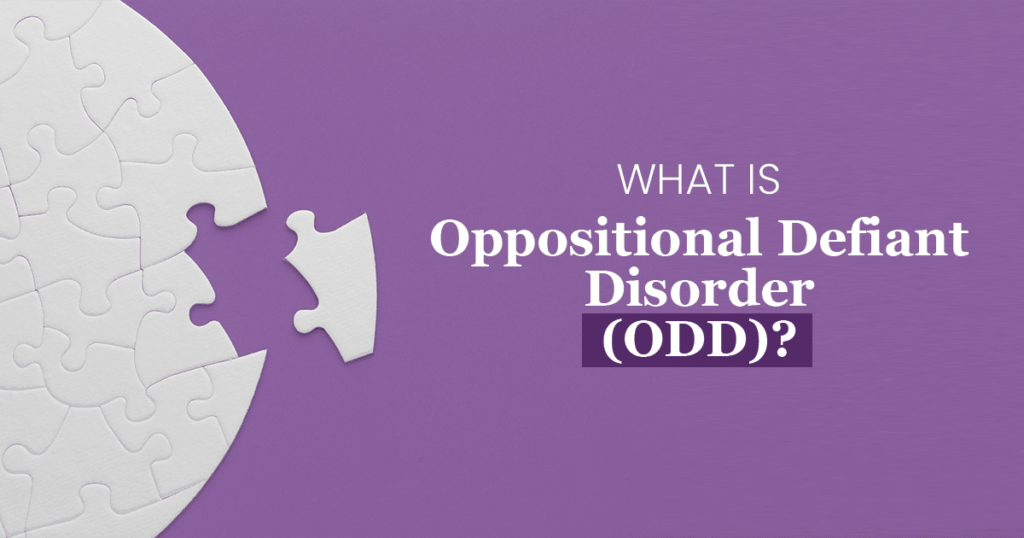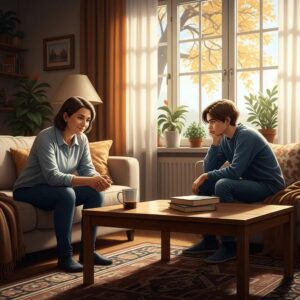Oppositional defiant disorder (ODD) is a disorder in which a child exhibits a pattern of uncooperative, defiant, angry, and bothersome conduct toward adults. The child’s normal daily functioning, including relationships and activities in the family and at school, is frequently disrupted by this conduct.
It’s not uncommon for children, particularly those in their “terrible twos” and early adolescence, to be oppositional or defiant of authority. They may show their disobedience by arguing with adults, such as their parents or instructors, defying them, or talking back to them. When a child’s behavior lasts more than six months and is out of character for their age, it may indicate that the youngster has Oppositional defiant disorder.
Many adolescents and teenagers with the oppositional defiant disorder have co-occurring conditions, such as
- attention deficit hyperactivity disorder (ADD) (ADHD)
- Disabilities in learning
- Mood disturbances (such as depression)
- Anxiety disorders are a type of anxiety condition.
- Some children with Oppositional defiant disorder go on to acquire conduct disorder, a more serious behavior disease.
Causes of Oppositional Defiant Disorder
Although the exact etiology of Oppositional Defiant Disorder is unknown, it is thought to be caused by a mix of biological, genetic, and environmental factors.
- Biological
According to certain research, behavior disorders might be caused by flaws in or damage to certain parts of the brain. Furthermore, ODD has been connected to neurotransmitters, which are brain chemicals. Neurotransmitters are chemical messengers that allow nerve cells in the brain to communicate with one another.
Messages may not make it through the brain correctly if these substances are out of balance or not acting properly, resulting in symptoms. Furthermore, many adolescents and teenagers with ODD often suffer from other mental illnesses such as ADHD, learning problems, depression, and anxiety.
- Mental
Because Oppositional Defiant Disorder can be inherited, many children and teenagers with ODD have close family members who suffer from mental illnesses such as mood disorders, anxiety disorders, and personality disorders.
- Environmental
Factors like tumultuous home life, a family history of mental illness, substance misuse, and inconsistent parental discipline.
Symptoms of Oppositional Defiant Disorder
ODD behaviors commonly appear in children when they are in elementary school. However, the disorder can be detected in youngsters as young as three years old.
- A youngster with Oppositional Defiant Disorder may be prone to becoming easily enraged, angry, or agitated, as well as throwing temper tantrums regularly.
- Argue with people regularly, especially the most familiar persons in their lives, such as parents.
- Refusing to follow the rules and appearing to be try to offend or irritate people
- Have low self-esteem
- Have a low threshold for frustration
- Attempt to place blame on others for any mishaps or bad behavior.
Diagnosis
Mental diseases in children, like in adults, are diagnosed based on indications and symptoms that point to a specific disorder. These are the step-by-step procedures needed for proper diagnosis.
- If the child is exhibiting symptoms, the doctor will begin by taking a comprehensive medical history and completing a physical examination.
- Although no particular laboratory tests exist to identify conduct disorder, the doctor may utilize a variety of procedures, such as blood testing, to rule out physical illness or pharmaceutical side effects as the source of the symptoms. The doctor will also search for indicators of ADHD and depression, which are common co-occurring diseases with Oppositional Defiant Disorder.
- If a physical cause for the symptoms cannot be found, the doctor may refer the kid to a child and adolescent psychiatrist or psychologist. These medical experts have received specialized training in diagnosing and treating mental problems in children and teenagers.
- To examine a child for a mental condition, psychiatrists and psychologists utilize specifically created interview and evaluation methods. A diagnosis is made based on the child’s symptoms and the provider’s observations of the child’s attitude and behavior.
- Because children typically have difficulty explaining their problems or understanding their symptoms, the doctor must frequently rely on reports from the child’s parents, teachers, and other adults.
The doctor next analyzes whether the child’s symptoms are consistent with Oppositional Defiant Disorder as defined by the American Psychiatric Association’s Diagnostic and Statistical Manual of Mental Disorders (DSM-5), which is the standard reference book for recognized mental diseases.
Treatment for Oppositional Defiant Disorder (ODD)
Many factors influence oppositional defiant disorder treatment, including the child’s age, the severity of the symptoms, and the child’s capacity to participate in and tolerate various therapies. A combination of the following treatments is frequently used:
- Psychotherapy
Psychotherapy (a sort of counseling) is intended to assist the youngster in developing more effective ways of expressing and controlling their anger. Cognitive-behavioral therapy seeks to modify a child’s thinking (cognition) to enhance behavior. Family therapy may be utilized to aid in the improvement of family interactions and communication. Parent behavioral therapy is a specialized therapeutic technique that teaches parents how to influence their child’s behavior at home positively.
- Medicine
Although no medication is specifically licensed to treat Oppositional Defiant Disorder, we may use it to address other disorders or symptoms that exacerbate a child’s behavior.
3. Prevention
Although we cannot prevent oppositional Defiant Disorder, identifying and acting on symptoms as soon as they occur can help the kid and family feel less distressed and avoid many of the issues that come with it. Family members can also learn what to do if symptoms reappear.
Furthermore, giving a nurturing, supporting, and consistent family setting with a balance of love and discipline may assist to alleviate symptoms and prevent defiant behavior outbursts. To learn more about the treatment of Oppositional Defiant Disorder (ODD) in Southern California, call Hillside Horizon for Teens at 855-746-8378.




